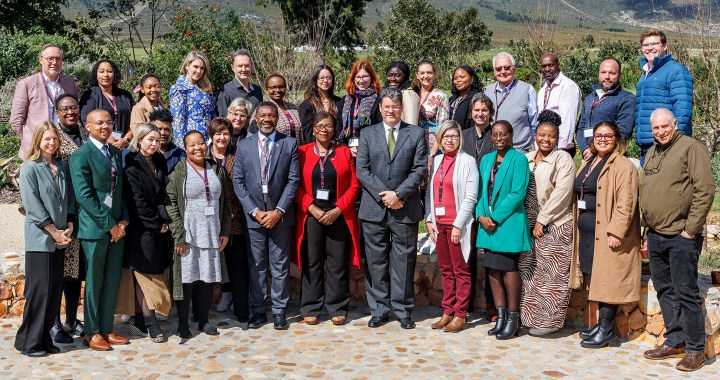This article originally appeared on Daily Maverick.
During the Expert Symposium on Social Justice, Hunger and the Constitution, held at Bertha Retreat at Boschendal in Franschhoek, experts attempted to answer questions such as who is responsible for ensuring the right to food is met. Boschendal, Cape Town. (Photo: iStock) By Naledi Sikhakhane 10 Sep 2024 Experts at a Stellenbosch University event on food justice said while millions of South Africans are going hungry, tonnes of food are wasted annually. They called for urgent reforms, describing access to food as a constitutional right rather than charity.
Up to 20 million South Africans are severely food insecure. About 27% of children under the age of five suffer from malnutrition and stunting. Amid such hunger, 19 million kilograms of food go to waste yearly in South Africa.
Who is responsible for ensuring the right to food is met? Does the Constitution sufficiently hold duty-bearers accountable? Have we failed the Constitution or has it failed us?
These questions were posed last week during the Expert Symposium on Social Justice, Hunger and the Constitution, held by Stellenbosch University’s Centre for Social Justice at the Bertha Retreat on the Boschendal wine farm in Franschhoek.
Academics, policymakers, government officials, hunger alleviation organisations and corporate representatives presented the solutions they have implemented in relation to hunger and food security in South Africa and beyond.
Professor Linus Opara, Stellenbosch University’s South African Research Chair in Post-Harvest Technology, said that to understand malnutrition and hunger one has to look at why there is hunger in the midst of plenty.
Read more: SA faces a catastrophic hunger crisis while 10m tonnes of foodstuff goes to waste every year
Opara said one has to look at the food system: who controls the food, who produces and prepares the food and who has access to the food? The discussion was not only about the quantity of food but also the quality – not only were people starving, they had little access to healthy foods.
He and other experts agreed that one of the immediate solutions is curbing food waste in South Africa.
“We are losing one-third of everything we are producing, although the issue of food involves economics, agriculture, technology, law and other factors. We have to look at why this is happening and how we can change that,” said Opara.
Professor Thuli Madonsela facilitated the expert Symposium on Social Justice, Hunger and the Constitution. This photo was taken during during The Gathering Twenty Twenty Four Election Edition at the Cape Town International Convention Centre on 14 March 2024. (Photo: Shelley Christians)
Opara was one of 32 speakers at the symposium, many of whom highlighted the intersections of food poverty, such as the legacy of apartheid in spatial planning, minimum wage and other socioeconomic issues.
Centre for Social Justice director and former Public Protector Thuli Madonsela said her centre has had to help with hunger alleviation in Stellenbosch because students said they often have to choose between transport, data and food.
“Food is a physiological need which needs to be addressed before one can come up with lofty ideas, study and so forth. It is against this background that last year’s summit, even though it was about broader social justice, fed into the conversation of tackling hunger. This is not only a South African problem, it’s a universal problem,” said Madonsela.
Dr Charlene Kreuser, an attorney at the Legal Resources Centre, spoke about promoting access to food through amending tax legislation related to food donations.
Kreuser pointed out that the current laws do not incentivise but can deter food donations because big food companies do not want to be responsible for the storage, transportation and distribution of food they can no longer sell, so tonnes of edible food go to waste while people go hungry.
“We need a diverse approach to ensure access to food. The problem is not necessarily food availability but food accessibility. We have challenges of food waste in South Africa. Nineteen million kilograms go to waste, but what if we could redirect safe, nutritious food that would be wasted?”
Kreuser said that at the moment, corporations can claim tax deductions for food donations up to 10% of their taxable income. At the same time, businesses can claim a tax deduction for disposing of surplus food if they claim it as a business loss.
Other speakers echoed Kreuser’s sentiments around the need for legislation that is more intentional to address food insecurity. She added that although such legislation will not be the ultimate solution, it has worked in countries such as Colombia and can make a positive impact.
Read more: Government releases ‘draft strategy’ to reduce annual 10 tonnes of food losses and waste
Experts at the symposium mostly agreed that the Constitution as it stands has all the right laws but that an expanded framework under sections 27 and 28 could help to address the multidimensional challenges.
Speakers said the setup of government departments needs to be reconsidered to ensure they collaborate and don’t work in silos.
Thirty-two speakers presented ideas to curb hunger in South Africa using the Constitution, during the symposium at Boschendal. (Photo: Centre for Social Justice)
Extraordinary professor in the faculty of law at North West University, Nic Olivier, walked the audience through which institutes have a responsibility to meet the right to food in South Africa.
Olivier said all institutions dealing with children under the age of 18, including early childhood development centres, primary schools, and even universities have a responsibility to meet the absolute human right of access to food. He listed municipalities, as well as other organs of state, saying the law calls on them to collaborate with each other to meet the right to food.
“Municipalities have no choice but to meet the basic needs of the community. They also must participate in the programmes by the national government,” he said.
Olivier said many children fall through the cracks. For example, children who are not yet of school-going age and are not in early childhood development centres will not have access to some of the hunger alleviation programmes. The same goes for children from the age of 15 to 18 who may be out of school for various reasons.
“It’s not necessarily about new legislation but about implementing, and some of the implementing does not sit with us as we sit in this room, but can also be about matters such as political will.” DM


